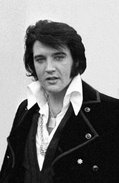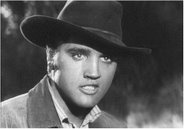Even in the 1950s era of blatant racism, Presley would publicly cite his debt to African American music, pointing to artists such as B. B. King, Arthur "Big Boy" Crudup, Jackie Wilson, Robert Johnson, Ivory Joe Hunter, and Fats Domino. The reporter who conducted Presley's first interview in New York City in 1956 noted that he named blues singers who "obviously meant a lot to him. I was very surprised to hear him talk about the black performers down there and about how he tried to carry on their music." Later that year in Charlotte, North Carolina, Presley was quoted as saying: "The colored folks been singing it and playing it just like I’m doin' now, man, for more years than I know. They played it like that in their shanties and in their juke joints and nobody paid it no mind 'til I goosed it up. I got it from them. Down in Tupelo, Mississippi, I used to hear old Arthur Crudup bang his box the way I do now and I said if I ever got to a place I could feel all old Arthur felt, I’d be a music man like nobody ever saw." Little Richard said of Presley: "He was an integrator. Elvis was a blessing. They wouldn’t let black music through. He opened the door for black music." B. B. King said he began to respect Presley after he did Arthur "Big Boy" Crudup material and that after he met him, he thought the singer really was something else and was someone whose music was growing all the time right up to his death.
Up to the mid 1950s black artists had sold minuscule amounts of their recorded music relative to the national market potential. Black songwriters had mostly limited horizons and could only eke out a living. But after Presley purchased the music of African American Otis Blackwell and had his "Gladys Music" company hire talented black songwriter Claude Demetrius, the industry underwent a dramatic change. In the spring of 1957 Presley invited African American performer Ivory Joe Hunter to visit Graceland and the two spent the day together, singing "I Almost Lost My Mind" and other songs. Of Presley, Hunter commented, "He showed me every courtesy, and I think he's one of the greatest."
However, certain elements in American society began to simply dismiss Presley as no more than a racist Southerner who stole black music, but in the words of Black R&B artist Jackie Wilson, "A lot of people have accused Elvis of stealing the black man's music, when in fact, almost every black solo entertainer copied his stage mannerisms from Elvis."
"Racists attacked rock and roll because of the mingling of black and white people it implied and achieved, and because of what they saw as black music's power to corrupt through vulgar and animalistic rhythms. The popularity of Elvis Presley was similarly founded on his transgressive position with respect to racial and sexual boundaries. White cover versions of hits by black musicians often outsold the originals; it seems that many Americans wanted black music without the black people in it," and Elvis had undoubtedly "derived his style from the Negro rhythm-and-blues performers of the late 1940s."
The Elvis stole black music theme is an enduring one with arguments for and against published in books (see: "Dispelling The Myths An analysis of American Attitudes and Prejudices", Todd Rheingold, Believe In The Dream Publications, USA, 1992, LOCC:93-090296, and on Elvis websites and popular music messageboards. Several arguments are presented on the Elvis Information Network website in its Spotlight On The King section.
"Many White people would be surprised to learn that Elvis Presley's hit 'Hound Dog' was first popularized by a Black woman, Big Mama Thornton. Elvis and his music live on the collective memory of Whites, yet Little Richard, some of whose work Elvis borrowed, has been forgotten." A southern background combined with a performing style largely associated with African Americans had led to "bitter criticism by those who feel he stole a good thing," as Tan magazine surmised. No wonder that Elvis became "a symbol of all that was oppressive to the black experience in the Western Hemisphere". What is more, Presley was widely believed to have said, "The only thing black people can do for me is shine my shoes and buy my records." It was claimed that the alleged comment was made either in Boston or on Edward R. Murrow's Person to Person. A black southerner in the late 1980s even captured that sentiment: "To talk to Presley about blacks was like talking to Adolf Hitler about the Jews."
In his scholarly work Race, Rock, and Elvis, Tennessee State University professor Michael T. Bertrand examined the relationship between popular culture and social change in America and these allegations against Presley. Professor Bertrand postulated that Presley's rock and roll music brought an unprecedented access to African American culture that challenged the 1950s segregated generation to reassess ingrained segregationist stereotypes. The American Historical Review wrote that the author "convincingly argues that the black-and-white character of the sound, as well as Presley's own persona, helped to relax the rigid color line and thereby fed the fires of the civil rights movement." The U.S. government report stated: "Presley has been accused of "stealing" black rhythm and blues, but such accusations indicate little knowledge of his many musical influences." "However much Elvis may have 'borrowed' from black blues performers (e.g., 'Big Boy' Crudup, 'Big Mama' Thornton), he borrowed no less from white country stars (e.g., Ernest Tubb, Bill Monroe) and white pop singers (e.g., Mario Lanza, Dean Martin)," and most of his borrowings came from the church; its gospel music was his primary musical influence and foundation."
Whether or not it was justified, the fact remains that distrust of Presley was common amongst the general African-American population after the accusations of racism were made public. According to George Plasketes, several songs came out after the singer's death which are a part of a "démystification process as they portray Elvis as a racist." In his book, Colored White: Transcending the Racial Past, David Roediger considers contemporary "wiggers" (white kids "acting Black") in light of the tensions in racial impersonation embodied by Elvis Presley.
skip to main |
skip to sidebar

Elvis Presley

Elvis Presley
Elvis Presley: Biography, Music, Movies
Elvis Presley

Elvis Presley
Blog Archive
-
▼
2007
(32)
-
▼
March
(32)
- Elvis Presley
- Elvis Presley - Origin of the surname
- Elvis Presley - Early life
- Elvis Presley - Voice characteristics
- Elvis Presley - Sun recordings
- Elvis Presley - Presley and his manager "Colonel" ...
- Elvis Presley - Presley and African American music
- Elvis Presley - A danger to American culture?
- Elvis Presley - American icon
- Elvis Presley - Military service
- Elvis Presley - 1960s film career
- Elvis Presley - 1968 comeback
- Elvis Presley - 1969-1977 - Elvis's final years
- Elvis Presley - Abuse of drugs
- Elvis Presley - Death and burial
- Elvis Presley - Controversy surrounding death
- Elvis Presley - Political beliefs
- Elvis Presley - Devotion to his mother
- Elvis Presley - High school and early stardom
- Elvis Presley - The women in his life
- Elvis Presley - Anita Wood and Priscilla Beaulieu
- Elvis Presley - Last relationships
- Elvis Presley - The Memphis Mafia and other male f...
- Elvis Presley - Lasting legacy
- Elvis Presley - The fans
- Elvis Presley - The ritualization of the "Elvis cult"
- Elvis Presley - Critical voices
- Elvis Presley - The Elvis religion
- Elvis Presley - Presley in the 21st century
- Elvis Presley - Elvis lives?
- Elvis Presley - FBI files on Presley
- Elvis as a victim of blackmail
-
▼
March
(32)
Elvis Presley

Elvis Presley
Elvis Presley Films
1956 Love Me Tender
1957 Loving You
1957 Jailhouse Rock
1958 King Creole
1960 G.I. Blues
1960 Flaming Star
1961 Wild in the Country
1961 Blue Hawaii
1962 Follow That Dream
1962 Kid Galahad
1962 Girls! Girls! Girls!
1963 It Happened at the World's Fair
1963 Fun in Acapulco
1964 Kissin' Cousins
1964 Viva Las Vegas
1964 Roustabout
1965 Girl Happy
1965 Tickle Me
1965 Harum Scarum
1966 Frankie and Johnny
1966 Paradise, Hawaiian Style
1966 Spinout
1967 Easy Come, Easy Go
1967 Double Trouble
1967 Clambake
1968 Stay Away, Joe
1968 Speedway
1968 Live a Little, Love a Little
1969 Charro!
1969 The Trouble with Girls
1969 Change of Habit




No comments:
Post a Comment